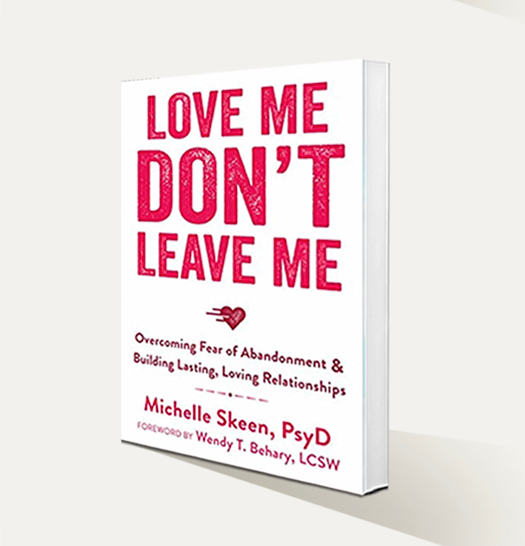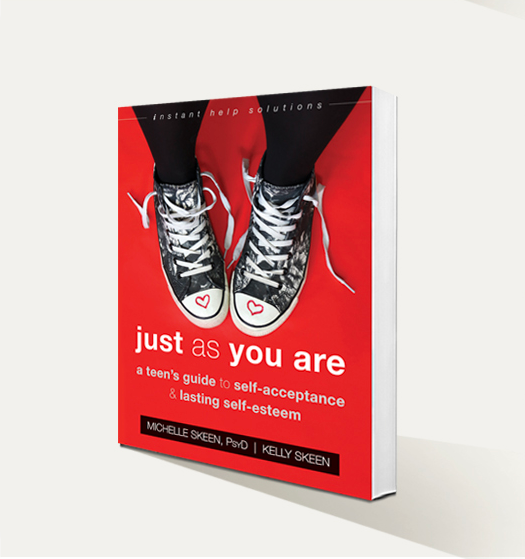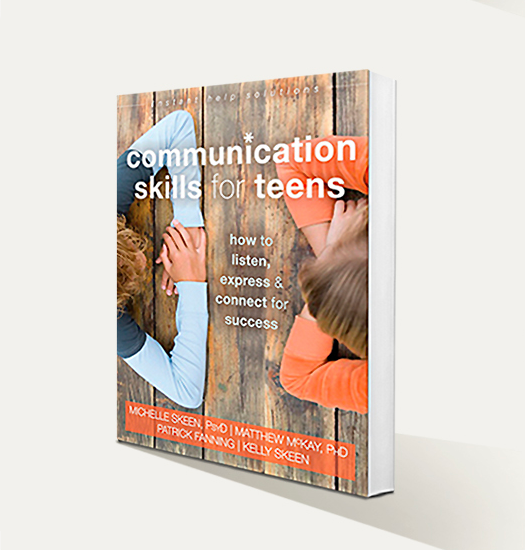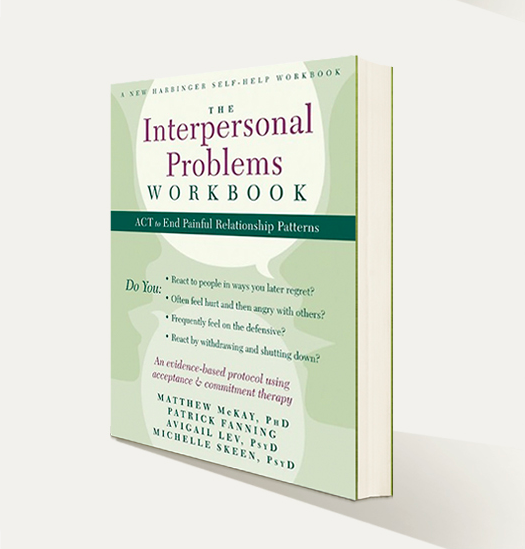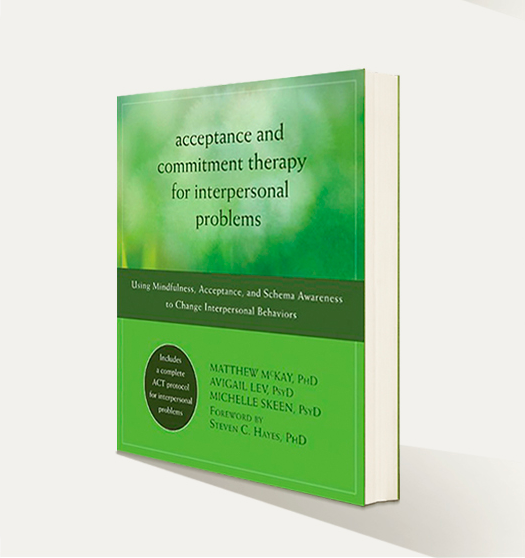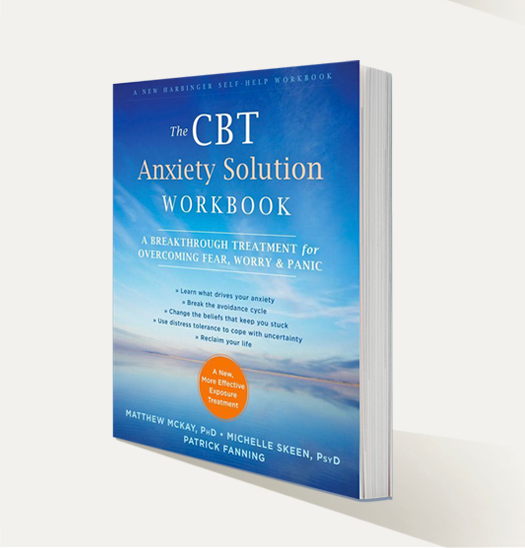My radio show on Thursday April 25, 2019
This week on Relationships 2.0 my guest is Alex Korb PhD author of The Upward Spiral Workbook: A Practical Neuroscience Program for Reversing the Course of Depression
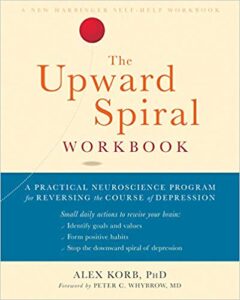 About the book:
About the book:
Positive life changes lead to positive brain changes. Drawing on the huge success of his groundbreaking book, The Upward Spiral, neuroscientist Alex Korb offers actionable, step-by-step skills to help you reshape your brain and create an upward spiral towards a happier, healthier life.
Depression is defined by a collection of symptoms. You feel crappy most of the time. Nothing seems interesting, and everything seems overwhelming. You have trouble with sleep. You feel guilty and anxious and have thoughts that life isn’t worth living. Each symptom reinforces and inspires new symptoms, and this is a sign that your brain circuits are caught in the downward spiral of depression. So, how can you reverse it?
In his first book, The Upward Spiral, neuroscientist Alex Korb demystified the intricate brain processes that cause depression and outlined a practical and effective approach for getting better. Based on the latest research, this evidence-based workbook takes the theory behind Korb’s breakthrough book and distills it into concrete, actionable exercises and skills.
Just as one small trigger can drag you down, an effective intervention can start enough momentum to carry you back up. Exercise, attention to breathing, gratitude, sleep hygiene, and positive social interactions are just some of the offerings in this workbook that can help alter activity in specific neural circuits, setting you on the path toward an upward spiral to happiness and well-being.
About the author:
Alex Korb, PhD, is a neuroscientist who has studied the brain and mental health for over fifteen years, starting with an undergraduate degree in neuroscience from Brown University. He received his PhD in neuroscience from the University of California, Los Angeles (UCLA), where he wrote his dissertation and numerous scientific articles on depression. He is author of The Upward Spiral, and is currently adjunct assistant professor at UCLA in the department of psychiatry. Outside of the lab, he is a scientific consultant for the biotech industry, and is head coach of the UCLA Women’s Ultimate Frisbee team. He has a wealth of experience in yoga and mindfulness, physical fitness, and even stand-up comedy.
My radio show on Thursday November 15, 2018
This week on Relationships 2.0 my guest is Mitch Abblett PhD (PART 2) author of The Five Hurdles to Happiness and the Mindful Path to Overcoming Them
 About the book: A practical approach to becoming aware of the “five hindrances”–the negative qualities that inhibit living the awakened life–and to breaking free of them in order to live more mindfully, effectively, compassionately. Five obstacles stand in between you and true happiness. What are they and how can you overcome them? Buddhist traditions teach that there are five negative qualities, or hindrances, that inhibit people from living an awakened life. Here, Mitch Abblett gives this teaching a modern, secular interpretation and helps you identify the hurdles that are blocking your contentment—desire, hostility, sluggishness, worry, and doubt—and how you can take your first steps to overcoming them. Combining traditional wisdom with contemporary psychology and using examples from his psychotherapy practice, Abblett uses the hurdles as a frame for engaging you in a process of contemplating your own life and learning to lean into your experience rather than merely repeating bad habits. By doing this, you can break free from the hurdles and live more mindfully, effectively, and compassionately.
About the book: A practical approach to becoming aware of the “five hindrances”–the negative qualities that inhibit living the awakened life–and to breaking free of them in order to live more mindfully, effectively, compassionately. Five obstacles stand in between you and true happiness. What are they and how can you overcome them? Buddhist traditions teach that there are five negative qualities, or hindrances, that inhibit people from living an awakened life. Here, Mitch Abblett gives this teaching a modern, secular interpretation and helps you identify the hurdles that are blocking your contentment—desire, hostility, sluggishness, worry, and doubt—and how you can take your first steps to overcoming them. Combining traditional wisdom with contemporary psychology and using examples from his psychotherapy practice, Abblett uses the hurdles as a frame for engaging you in a process of contemplating your own life and learning to lean into your experience rather than merely repeating bad habits. By doing this, you can break free from the hurdles and live more mindfully, effectively, and compassionately.
About the author: Dr. Mitch Abblett is a clinical psychologist, author, consultant and speaker. As a clinician, his services focus on work with children, teens, parents, families and adults with whom he creates solutions for a range of concerns or desired growth areas. A clinician in the Boston area for over 15 years, he brings a wealth of clinical experience from various settings (hospitals, outpatient clinics, residential facilities and therapeutic schools) to his practice. For 11 years he served as the Clinical Director of the Manville School at Judge Baker Children’s Center in Boston – a Harvard-affiliated therapeutic school program for children and adolescents with emotional, behavioral and learning difficulties. He has also served as the Executive Director of the Institute for Meditation and Psychotherapy. As a consultant and speaker, Dr. Abblett empowers changes clients through collaborative, tailored interventions. His consultative and training work focuses on mindfulness, compassion and value-driven action and empowering clients to communicate skillfully and authentically. He improves clients’ school and work effectiveness, reduces the effects of stress, and increases skills for health self-management and daily productivity. Dr. Abblett’s writing includes a mindfulness-based book for clinicians (The Heat of the Moment: Mindful Management of Difficult Clients; WW Norton & Co.), Mindfulness for Teen Depression and Helping Your Angry Teen (both with New Harbinger), five decks of mindfulness practice cards such as Growing Mindful: A Deck of Mindfulness Practices for All Ages: PESI Publishing). His upcoming book, The Five Hurdles to Happiness-and the Mindful Path to Overcoming Them will be released by Shambhala Publications in August 2018. He also blogs regarding mindfulness applications in family and relationships on Mindful.org.
My daughter and I have a new book coming out June 2018
Just As You Are: A Teen’s Guide to Self-Acceptance & Lasting Self-Esteem, co-authored with my daughter, Kelly Skeen
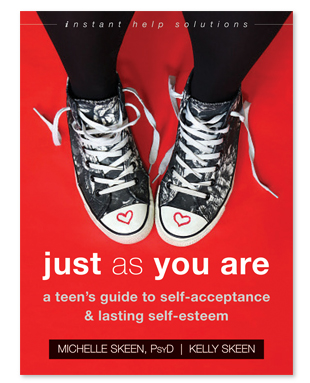
My radio show on Thursday September 7, 2017
This week on Relationships 2.0 my guest is Paul J. Christo, M.D. author of Aches and Gains: A Comprehensive Guide to Overcoming Your Pain
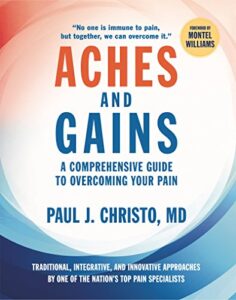 About the book:
About the book:
Pain is often treatable but doctors, medical professionals, and patients don’t understand the intricacies of chronic pain. Millions who suffer from pain become hopeless. With Aches and Gains, Dr. Paul Christo, a Johns Hopkins physician and leading pain specialist sheds new light on what it means to live with and overcome chronic pain. Dr. Christo shares celebrity interviews, including Naomi Judd, Lisa Swayze, Montel Williams, Ally Hilfiger, and Clay Walker, from his Sirius XM radio show Aches and Gains®, and stories from patients who have found a way to overcome the pain that once controlled their lives. Offering traditional, integrative, and innovative methods of easing pain, the book is a life-changing tool for anyone associated with pain including pain sufferers themselves, doctors, nurses, medical professionals, and caregivers.
Features a foreword by renowned talk show host Montel Williams.
About the author:
Dr. Paul Christo is one of America’s leading pain experts and hosts Aches and Gains®, the first national radio talk show dedicated to overcoming pain, stress reduction, and healthy living. Listed as a Top Doctor and in the top 1% for Pain Management by U.S. News & World Report, Dr. Christo is widely consulted by the media for his expertise in pain diagnosis and treatment.
My radio show on Thursday August 25, 2016
This week on Relationships 2.0 my guest is Arthur P. Ciaramicoli, EdD, PhD author of The Stress Solution: Using Empathy and Cognitive Behavioral Therapy to Reduce Anxiety and Develop Resilience. This is part 2 of our chat about his book.
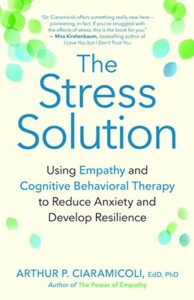
About the book:
Therapeutic tools for fighting the anxiety, fear, and depression caused by stress
“We work too much, sleep too little, love with half a heart, and wonder why we are unhappy and unhealthy,” writes clinical psychologist Arthur Ciaramicoli. In The Stress Solution, Ciaramicoli provides readers with simple, realistic, powerful techniques for using empathy and cognitive behavioral therapy to perceive situations accurately, correct distorted thinking, and trigger our own neurochemistry to produce calm, focused energy. He developed this approach over thirty-five years of working with clients struggling with depression, anxiety, and addictions. Over and over again, he has helped sufferers overcome old hurts and combat performance anxiety, fears, and excessive worry. Ciaramicoli’s pioneering approach offers new promise to readers facing a variety of stress-based concerns.
About the author:
Arthur P. Ciaramicoli, Ed.D., Ph.D., is a licensed clinical psychologist who has been treating clients for more than 35 years. He is the Chief Medical Officer of Soundmindz.org a popular mental health site. He is also a member of the American Psychological Association and the Massachusetts Psycho-logical Association. Currently in private practice, Dr. Ciaramicoli has been on the faculty of Harvard Medical School for several years, lecturer for the American Cancer Society, Chief Psychologist at Metrowest Medical Center, and director of the Metrowest Counseling Center and of the Alternative Medicine division of Metrowest Wellness Center in Framingham, Massachusetts.
Dr. Ciaramicoli is the author of The Stress Solution: How Using Empathy and Cognitive Behavioral Therapy decreases Anxiety and increases Resilience (New World Library, 2016), The Curse of the Capable: The Hidden Challenges to a Balanced, Healthy, High Achieving Life (Wiley, 2010), Performance Addiction: The Dangerous New Syndrome and How to Stop It from Ruining Your Life (Wiley 2004) and The Power of Empathy: A Practical Guide to Creating Intimacy, Self-Understanding, and Lasting Love (Dutton 2000), which is now published in 7 languages. His first book, Treatment of Abuse and Addiction, A Holistic Approach (Jason Aronson, 1997) was selected as Book of the Month by The Psychotherapy Book News. He is also the coauthor of Beyond the Influence: Understanding and Defeating Alcoholism (Bantam 2000).
Dr. Ciaramicoli lives in a suburb of Boston with his wife of 37 years.
His newsletter, blog comments and contact information are available at his web site, www.BalanceYourSuccess.com.
You can follow his daily insights at www.twitter.com/docapc.
Save
My radio show on Thursday March 31, 2016
This week on Relationships 2.0 my guest is Hugh Byrne PhD author of The Here and Now Habit: How Mindfulness Can Help You Break Unhealthy Habits Once and For All.
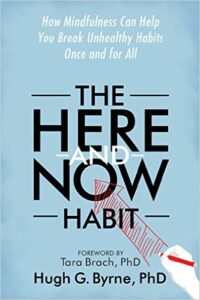
About the book:
Bad habits can take a hefty toll on your health and happiness. In The Here-and-Now Habit, mindfulness expert Hugh Byrne provides powerful practices based in mindfulness and neuroscience to help you rewire your brain and finally break the habits that are holding you back from a meaningful life.
Have you found yourself doing something and thinking, Why do I keep doing this? We all have an unhealthy habit—or two, or three. Yours may be as simple as wasting time on the Internet, constantly checking your e-mail, or spending too much time in front of the TV. Or, it may be more serious, like habitual drinking, emotional overeating, constant self-criticism, or chronic worrying. Whatever your harmful habit is—you have the power to break it.
The Here-and-Now-Habit provides proven-effective techniques to help you stop existing on autopilot and start living in the here and now. You’ll learn how to cultivate mindfulness to calm and focus your mind, be aware of thoughts without identifying with them or believing they are true, deal with difficult emotions, and clarify your own intentions regarding unhealthy habits by asking yourself, What do I want? How important is it to me to make this change?
By learning to pay attention to your thoughts and actions in the moment, you’ll discover how to let go of old patterns and create healthier habits and ways of living that will make you feel good about yourself. And when you feel good about you, you can do just about anything.
About the author:
Hugh G. Byrne, PhD, is a guiding teacher with the Insight Meditation Community of Washington (IMCW), and cofounder of the Mindfulness Training Institute of Washington. He has worked extensively in the fields of human rights and social justice, and is committed to advocating the benefits of mindfulness and other contemplative practices to help relieve the suffering of the world. He teaches classes, retreats, and workshops in the United States and internationally. Byrne resides in Silver Spring, MD.
My radio show on Tuesday October 14, 2014
My guest this week on Relationships 2.0 is Brian Leaf author of Misadventures of a Garden State Yogi: My Humble Quest to Heal My Colitis, Calm my ADD, and Find the Key to Happiness.
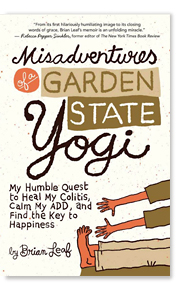 About the book:
About the book:
As a college freshman business major suffering from a variety of anxiety-related maladies, Brian Leaf stumbled into an elective: yoga. It was 1989. All his classmates were female. And men did not yet generally “cry, hug, or do yoga.” But yoga soothed and calmed Leaf as nothing else had. As his hilarious and wise tale shows, Leaf embarked on a quest for health and happiness — visiting yoga studios around the country and consulting Ayurvedic physicians, swamis, and even (accidentally) a prostitute. Twenty-one years later, he teaches yoga and meditation and is the beloved founder of a holistic tutoring center that helps students whose ailments he once shared.
About the author:
Brian Leaf, M.A., is the author of eleven books, including Misadventures of a Garden State Yogi, Name That Movie!, Defining Twilight, and McGraw-Hill’s Top 50 Skills for a Top Score. He is the only man alive to have written both a yoga memoir and multiple test-prep guides. He is not sure if this is a noble or dubious distinction.
Brian is Director of the New Leaf Learning Center in Massachusetts, where he has helped thousands of students from throughout the United States manage ADD and overcome test and math phobias.
Brian graduated from Georgetown University in 1993 with a B.A. in Business, English, and Theology.
In 1999, he completed a Masters through Lesley College specializing in yoga and ayurveda for Attention Deficit Disorder. Brian is certified as a Yoga Instructor, Ayurvedic Practitioner, Massage Therapist, Energyworker, and Holistic Educator, and he is an avid meditator. He has also dabbled with Bach Flower Essences, Cranio-Sacral Therapy, Reiki, Shiatsu, and Tai Chi. Can you top that?
So what’s the connection between yoga and test-prep? Let’s just say that one of Brian’s first yoga teaching gigs was at the ETS corporation (Educational Testing Service) in Princeton, NJ. They’re the folks who make the SAT. So now Brian gets paid hundreds of dollars per hour to share what he learned while the test-makers were half asleep in relaxation pose.
My radio show on Tuesday October 7, 2014
This week on Relationships 2.0 my guest is Ruth White, PhD author of Preventing Bipolar Relapse: A Lifestyle Program to Help You Maintain a Balanced Mood and Live Well.
 About the book:
About the book:
If you buy just one book on bipolar disorder, let this be it. There’s an old saying: “Prevention is better than cure.” If you have bipolar disorder, this is especially true. For you, it’s incredibly important to read the warning signs of a possible episode. For instance, you may find you are not sleeping as well as usual, or you might be sleeping too much. You may stop doing things that you normally enjoy, or you may start acting out your impulses in ways that alienate those around you or get you into trouble.
While the path to wellness for those with bipolar may involve psychiatric visits and medication adjustments, preventing manic and depressive episodes is the true key to staying healthy and happy. So how do you do it? And most importantly, how can you keep yourself motivated?
In this powerful, breakthrough book, bipolar expert Ruth C. White shares her own personal approach to relapse prevention using the innovative program SNAP (Sleep, Nutrition, Activity, and People). White also offers practical tips and tracking tools you can use anytime, anywhere. By making necessary lifestyle adjustments, you can maintain balanced moods, recognize the warning signs of an oncoming episode, and make the necessary changes to reduce or prevent it.
This is the first and only book on bipolar disorder that focuses exclusively on prevention. To help you stay well, White includes links to helpful online tracking tools so that you can manage your symptoms, anytime, anywhere. If you are ready to stop living in fear of your next episode, this life-changing book can help you take charge of your diagnosis—and your life.
About the author:
Dr. Ruth C. White is Clinical Associate Professor in the School of Social Work at the University of Southern California. Prior to USC, Dr. White received tenure at Seattle University where she taught since graduating with a PhD in social welfare from the University of California, Berkeley (2002-2013). She has masters degrees in social work (McGill) and public health (UC Berkeley) and has spent many years working in psycho-social treatment programs, correctional programs, and child welfare in the USA, Canada and the UK. She was inspired to write Bipolar 101 as a result of successfully dealing with her own challenges with bipolar disorder. Her latest book, Preventing Bipolar Relapse, is the first book on bipolar disorder to focus on prevention and details her SNAP (sleep, nutrition, activity, people) approach to prevention that is based on the latest scientific research on bipolar disorder. She is available for public speaking on mental health stigma and preventing bipolar disorder using the holistic, science-based approach found in Preventing Bipolar Relapse.
Her blog, bipolar-101.blogspot.com, summarizes some of the latest scientific research on bipolar disorder using language anyone can understand. For more information see her website: ruthcwhite.com Follow her on Twitter: @ruthcwhite
My radio show on Tuesday September 23, 2014
My guest this week on Relationships 2.0 is Marie Williams, author of Green Vanilla Tea: One Family’s Extraordinary Journey of Love, Hope and Remembering.
 About the book:
About the book:
Green Vanilla Tea is a true story of love and courage in the face of a deadly and little understood illness. With literary finesse, compassion, and a powerful gift of storytelling, Marie Williams writes poignantly of her husband Dominic’s struggles with early onset dementia and amyotrophic lateral sclerosis (ALS) at the age of 40, and how their family found hope amidst the wreckage of a mysterious neurological condition.
As the condition develops and progresses, the normally devoted family man and loving partner seems to disappear beneath an expressionless facade, erratic behavior, and a relentless desire to wander that often leaves him lost. The road to diagnosis is long and confusing, and what starts off as perplexing for the family then becomes frightening. The man they love is changing, and no one seems to know why. He no longer turns up to his sons’ high school events. He falls and bumps into things. He becomes verbally disinhibited, emotionally disengaged, and, at times, belligerent. He doesn’t seem to be able to read the social cues of other people. He gets lost in familiar places, as well as on obsessive work trips overseas. He recklessly spends the family money, leaving them in near financial ruin. Despite this, Williams and her children strive to find new ways to keep him safe and to connect with the husband and father they love so dearly.
While the family learns to cope with Dominic’s illness—which they call the Green Goblin—Williams is determined that her children reclaim the dad of their memories. She finds creative ways to make visible the stories of the man beyond the illness, and helps them remember him as the engaged, healthy, and loving man she fell in love with. She humanizes the experience through storytelling and assembling a quilt made up of transferred photographs, painted artwork, family footprints, and personal inscriptions from family and friends. This, along with tea rituals, music, and stories of fatherhood, love and value, support them as fierce advocates for Dominic’s dignity and give the family new ways to be together as they journey through his decline. Spanning between moments of intense joy and incredible sadness, this book is a passionate testament to one family’s unconditional love for one another. It is, “a tale of a strange place—the real world— in which green goblins and hope find a way to live together.”
Above all, it is a love story.
About the author:
Marie Williams has worked as a clinical social worker in health settings, nonprofit sectors, clinical education, and private practice. She is also an artist and believes in the power of creativity and story to transform. The Australian edition of Williams’ book, Green Vanilla Tea won the national Finch Memoir Prize in 2013. Williams lives in Brisbane, Australia.
My radio show on Tuesday July 29, 2014
This week on Relationships 2.0 my guest is Nicola P. Wright PhD CPsych co-author of Treating Psychosis: A Clinician’s Guide to Integrating Acceptance and Commitment Therapy, Compassion-Focused Therapy, and Mindfulness Approaches within the Cognitive Behavioral Therapy Tradition.
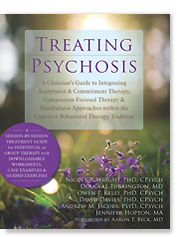 About the book:
About the book:
Psychosis can be associated with a variety of mental health problems, including schizophrenia, severe depression, bipolar disorder, anxiety, and post-traumatic stress disorders. While traditional treatments for psychosis have emphasized medication-based strategies, evidence now suggests that individuals affected by psychosis can greatly benefit from psychotherapy.
Treating Psychosis is an evidence-based treatment guide for mental health professionals working with individuals affected by psychosis. Using a cognitive behavioral therapy (CBT) approach that incorporates acceptance and commitment therapy (ACT), compassion-focused therapy (CFT) and mindfulness approaches, this book is invaluable in helping clinicians develop effective treatment for clients affected by psychosis. The guide provides session-by-session clinical interventions for use in individual or group treatment on an inpatient, outpatient, or community basis.
The book features 40 reproducible clinical practice forms and a companion website with additional downloadable clinical forms and tools, guided exercises, case examples, and resources. The therapeutic approaches presented are rooted in theory and research, and informed by extensive clinical experience working with client populations affected by psychosis. The approaches outlined in this book offer clinicians and clients the opportunity to partner in developing therapeutic strategies for problematic symptoms to enable those affected by psychosis to work toward valued goals and ultimately live more meaningful lives.
This guide emphasizes a compassionate, de-stigmatizing approach that integrates empowering and strengths-oriented methods that place the client’s values and goals at the center of any therapeutic intervention.
About the author:
Nicola P. Wright, PhD, CPsych, is a clinical psychologist in the schizophrenia program of the Royal Ottawa Health Care Group (The Royal). She also held the roles of chief of psychology and director of training for the Royal’s Psychology Residency Program and served as president of the Canadian Council of Professional Psychology Programs. Wright provides individual and group therapy, as well as professional training workshops, integrating acceptance and commitment; mindfulness; and compassion-focused approaches in cognitive behavioral therapy (CBT) for people who experience psychosis. Wright is an active researcher and clinical professor in the School of Psychology at the University of Ottawa and a lecturer with the department of psychiatry, University of Ottawa. In addition, she is a founding member of the Canadian Association of CBT and a staff supervisor with the Beck Institute of CBT. Wright lives in Ottawa, Canada.













